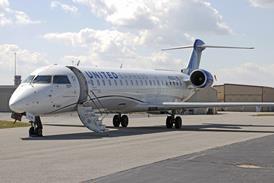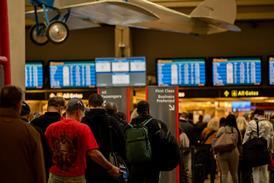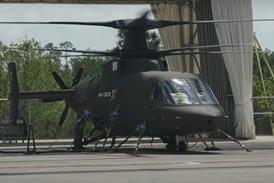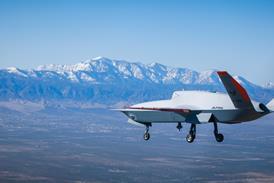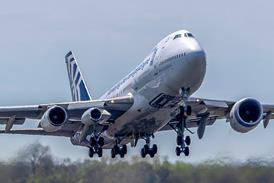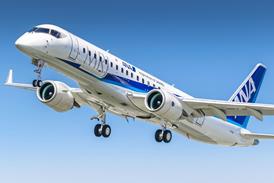Garry Cullen must really love the airline business. The 63 year-old former Aer Lingus chief executive has come out of retirement twice, both for much smaller carriers that are not exactly household names.
Cullen, who spent his first six years after Aer Lingus in the
“It’s been an enjoyable experience,” Cullen says. “It’s been a contrast working for one man rather than seven governments in the
 Aer Arann’s owner and former managing director, Padraig O’Ceidigh, persuaded Cullen to take over the managing director post in June 2006. O’Ceidigh had just placed an order for 10 ATR 72-500s, which Cullen says rejuvenated Aer Arann’s 400 employees because the carrier had never operated a new aircraft in its 37-year history. “The staff has been there from the beginning. There is a tremendous sense of pride and accomplishment. There are no unions. It’s absolutely a different type of culture [compared to Aer Lingus],” Cullen says.
Aer Arann’s owner and former managing director, Padraig O’Ceidigh, persuaded Cullen to take over the managing director post in June 2006. O’Ceidigh had just placed an order for 10 ATR 72-500s, which Cullen says rejuvenated Aer Arann’s 400 employees because the carrier had never operated a new aircraft in its 37-year history. “The staff has been there from the beginning. There is a tremendous sense of pride and accomplishment. There are no unions. It’s absolutely a different type of culture [compared to Aer Lingus],” Cullen says.
When O’Ceidigh purchased Aer Arann back in 1997 it was a tiny operator providing island-hopping services and carrying less than 100,000 passengers per year. Today it operates five ATR 42-300s, nine ATR 72-200s and two ATR 72-500s. It carries well over 1 million passengers per year and generates about €100 million ($148 million) in annual revenues. O’Ceidigh continues to serve as chairman but it was time for him to turn over the reigns to an experienced airline executive like Cullen to lead the carrier through its next growth spurt.
“It was taking a bunch of his time,” Cullen explains. “He’s an entrepreneur and has his fingers in a lot of pies. He wanted to pull back a bit. And the company had grown very fast. It got to the point it needed structure.”
Cullen’s first order of business was to drop unprofitable routes and outsource ground handling at Aer Arann’s
Cullen says Aer Arann, which offers frills but low fares, has been able to expand rapidly over the last decade on the back of increasing demand for services at
By going into small easy-to-use airports, Aer Arann has grown fast while avoiding competing with Ryanair or Aer Lingus. It helps that two of Aer Arann’s bases,
The next phase of Aer Arann’s expansion could see the carrier add regional jets and longer routes. Cullen says the carrier will evaluate potential regional jets next year as it starts considering its options for expansion beyond early 2009, when the last of the 10 new ATR 72-500s are delivered. The regional jets, most likely 70-seat Embraer 170s, could be part of a new five-year plan that will be considered by the carrier’s board in June.
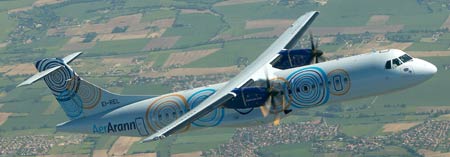
“We’ll have to do the analysis and make a call by the second half of next year on what is the right fleet for expansion after 2009. Once we make a decision where to go beyond 2009, we’ll look at financing opportunities. We’ll need more capital if we expand to the next level,” he says, adding that whether this includes a public offering will be up to O’Ceidigh.
Cullen says regional jets are needed for Aer Arann to expand beyond its current niche of operating flights of less than two hours to regional airports in the
“Until we move to regional jets that’s what we’re focused on,” Cullen says, adding that routes beyond northern
With regional jets Aer Arann will be able to launch services from Irish regional airports to destinations throughout continental
Aer Arann has inked a new codeshare agreement with Aer Lingus which is expected to be implemented shortly. Cullen says the codeshare will initially only cover Aer Arann-operated domestic flights, but adds: “My belief is they’ll need feed from more than just domestic
Aer Lingus plans to expand its long-haul network in conjunction with the opening of a new terminal at
More international services could be critical as subsidies on some domestic routes are phased out. About 10% of Aer Arann’s ATR services still consists of PSO routes and its sister carrier,
What’s next for Cullen? He has promised O’Ceidigh he will lead Aer Arann for at least two years and this will likely turn into three. But Cullen is looking forward to retiring again and spending more time at his homes in
Source: Airline Business

